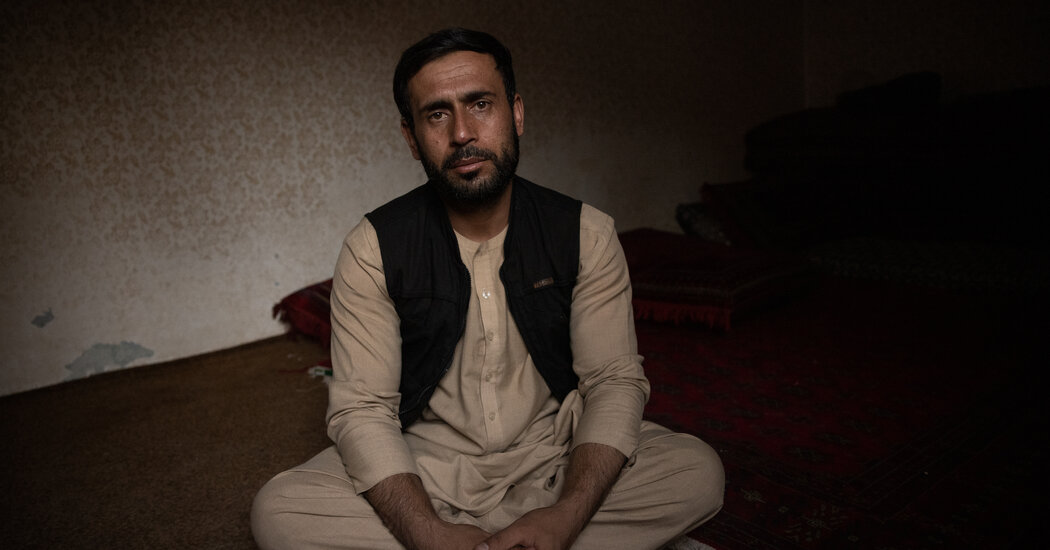Surviving Relatives of U.S. Drone Strike Victims Remain Stranded in Afghanistan

WASHINGTON — Soon after the U.S. military mistakenly killed 10 civilians, including seven children, last August in the final U.S. drone strike before American troops withdrew from Afghanistan, the Biden administration pledged to help surviving members of the family relocate to the United States for their safety.
Nearly a year later, fewer than a dozen of the 144 family members have been resettled in the United States and 32 people remain trapped in Afghanistan with little hope of getting out soon, advocates for the family said on Monday. The rest have been stuck for months in a diplomatic limbo after being transported to three countries to await screening to enter the United States.
The odyssey of the family members of Zemari Ahmadi, the driver of a white Toyota sedan that was struck by the American drone, and others employed by Mr. Ahmadi’s aid organization in Afghanistan is a saga of passport problems, bureaucratic red tape and Taliban capriciousness. On one day in June, for instance, 43 family members traveling overland were allowed to cross into Pakistan. The very next day, a similar group was turned back at the border after the Taliban imposed new travel-document rules.
Lawyers for the family members praised the efforts of the Pentagon and the State Department to help evacuate their clients, and said they had refrained from commenting publicly until now to protect their clients’ safety. But they said much more needed to be done and were now breaking their silence.
“As the anniversary of the strike approaches, the public needs to know that the government is failing to meet its promises, and our clients’ lives are in the United States’ hands,” said Brett Max Kaufman, a senior staff attorney for the American Civil Liberties Union, which is representing members of Mr. Ahmadi’s family as well as other employees of Nutrition & Education International, Mr. Ahmadi’s aid organization in Afghanistan.
Mr. Ahmadi’s family members and other employees of the aid organization the U.S. government agreed to evacuate are a small subset of the more than 120,000 Afghans who were airlifted after the Taliban seized control of the country last August, and the thousands who sought to flee but have so far failed.
Officials said the prospects for extracting the last 32 family members hiding in Afghanistan became more complicated after the C.I.A. two weeks ago killed Ayman al-Zawahri, the leader of Al Qaeda, while he was hiding out in a house in a crowded section of the Taliban-controlled Afghan capital.
“I remain increasingly scared for the people — including Zemari’s family members and our N.E.I. colleagues — who are still stuck in Afghanistan without any certainty or timeline to get out,” Steven Kwon, the founder and president of Nutrition & Education International, said in a statement.
“The U.S. government must keep its promise and get all those affected by its mistaken drone strike to safety before it’s too late,” Mr. Kwon said.
Pentagon officials said they had been working for months along with State Department and White House colleagues to evacuate the family members and other employees of the aid organization, despite no longer having any American military or diplomatic presence in Afghanistan.
“The Department of Defense, in coordination with other U.S. government departments and agencies, continues to take steps to respond to the Aug. 29, 2021, airstrike in Kabul, Afghanistan,” Todd Breasseale, the acting Pentagon press secretary, said in a statement. “To protect the privacy of the family members, as well as to help protect their safety and security, we are not able to provide more information regarding these efforts at this time,” Mr. Breasseale added.
Senior Defense Department officials and military commanders said soon after the Aug. 29 drone strike that Mr. Ahmadi had nothing to do with the Islamic State, contrary to what military officials had previously asserted. Mr. Ahmadi’s only connection to the terrorist group appeared to be a fleeting and innocuous interaction with people in what the military believed was an Islamic State safe house in Kabul, an initial link that led military analysts to make one misjudgment after another while tracking Mr. Ahmadi’s movements in the sedan for the next eight hours.
In addition to resettlement in the United States, the Pentagon has offered unspecified condolence payments to family members. Administration officials and lawyers for the family said negotiations over any payments have been suspended until all family members have been safely evacuated from Afghanistan.
